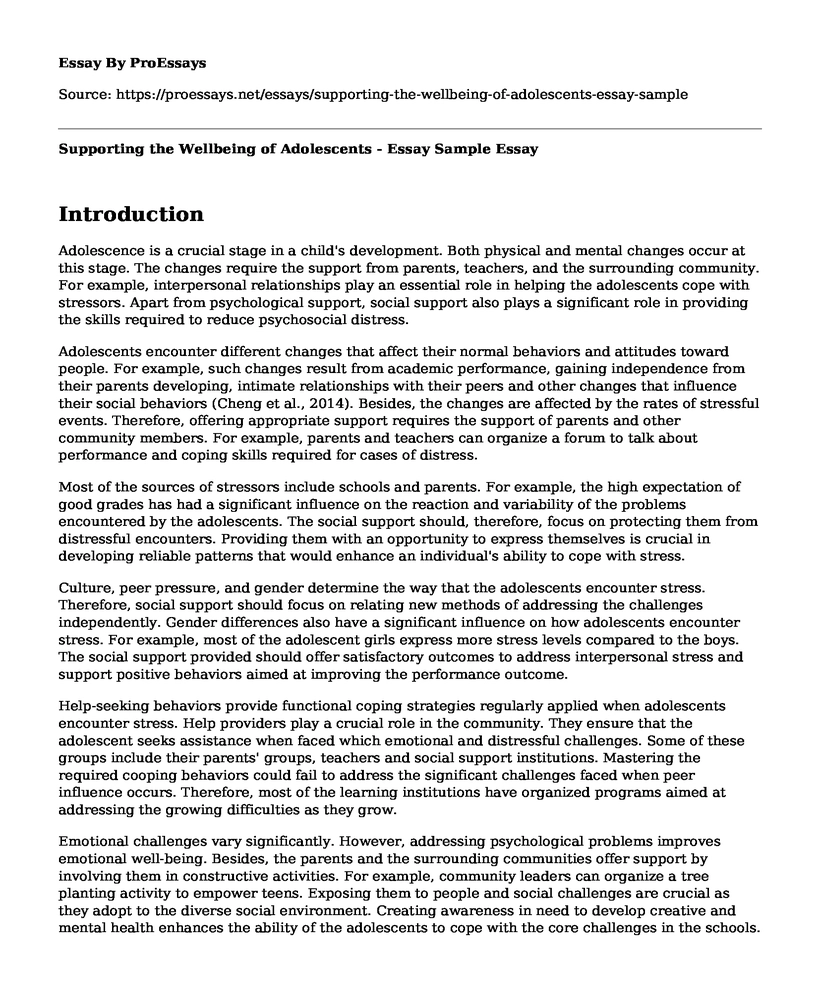Introduction
Adolescence is a crucial stage in a child's development. Both physical and mental changes occur at this stage. The changes require the support from parents, teachers, and the surrounding community. For example, interpersonal relationships play an essential role in helping the adolescents cope with stressors. Apart from psychological support, social support also plays a significant role in providing the skills required to reduce psychosocial distress.
Adolescents encounter different changes that affect their normal behaviors and attitudes toward people. For example, such changes result from academic performance, gaining independence from their parents developing, intimate relationships with their peers and other changes that influence their social behaviors (Cheng et al., 2014). Besides, the changes are affected by the rates of stressful events. Therefore, offering appropriate support requires the support of parents and other community members. For example, parents and teachers can organize a forum to talk about performance and coping skills required for cases of distress.
Most of the sources of stressors include schools and parents. For example, the high expectation of good grades has had a significant influence on the reaction and variability of the problems encountered by the adolescents. The social support should, therefore, focus on protecting them from distressful encounters. Providing them with an opportunity to express themselves is crucial in developing reliable patterns that would enhance an individual's ability to cope with stress.
Culture, peer pressure, and gender determine the way that the adolescents encounter stress. Therefore, social support should focus on relating new methods of addressing the challenges independently. Gender differences also have a significant influence on how adolescents encounter stress. For example, most of the adolescent girls express more stress levels compared to the boys. The social support provided should offer satisfactory outcomes to address interpersonal stress and support positive behaviors aimed at improving the performance outcome.
Help-seeking behaviors provide functional coping strategies regularly applied when adolescents encounter stress. Help providers play a crucial role in the community. They ensure that the adolescent seeks assistance when faced which emotional and distressful challenges. Some of these groups include their parents' groups, teachers and social support institutions. Mastering the required cooping behaviors could fail to address the significant challenges faced when peer influence occurs. Therefore, most of the learning institutions have organized programs aimed at addressing the growing difficulties as they grow.
Emotional challenges vary significantly. However, addressing psychological problems improves emotional well-being. Besides, the parents and the surrounding communities offer support by involving them in constructive activities. For example, community leaders can organize a tree planting activity to empower teens. Exposing them to people and social challenges are crucial as they adopt to the diverse social environment. Creating awareness in need to develop creative and mental health enhances the ability of the adolescents to cope with the core challenges in the schools.
The society can further offer support through counseling and interactive events. Examples include playing soccer, athletics or indoor games. The process occurs through the introduction of the coping skills required in for improving the adolescents' major emotional and social problems. Apart from the social support, reducing obstacles and causes of distressful events addresses disorders such as depression. The adolescents should be encouraged to offer support to their peers and developing a positive attitude across different setting.
Interpersonal relationship with the family peers and friends is crucial in disclosing problems. Providing them with an opportunity to communicate their problems ensures that the adolescents access the required needs from immediate people. Besides, they tend to rely on people whom they trust and mature to approve for any affirmative action aimed at addressing the problem. However, emotional support is their preferred type of assistance.
References
Cheng, Y., Li, X., Lou, C., Sonenstein, F. L., Kalamar, A., Jejeebhoy, S., ... & Ojengbede, O. (2014). The association between social support and mental health among vulnerable adolescents in five cities: findings from the study of the well-being of adolescents in vulnerable environments. Journal of Adolescent Health, 55(6), S31-S38.
Cite this page
Supporting the Wellbeing of Adolescents - Essay Sample . (2022, Nov 13). Retrieved from https://proessays.net/essays/supporting-the-wellbeing-of-adolescents-essay-sample
If you are the original author of this essay and no longer wish to have it published on the ProEssays website, please click below to request its removal:
- Case Stude Example of Major Depressive Disorder
- Essay on Importance of Prayer, Reflection and Meditation
- Personal Opinion About Mental Health - Essay Sample
- Essay Example on Embrace Diversity for Creative Success: Nissan's Cross-Cultural Approach
- Essay Sample on Psychodynamic Psychotherapy: Understanding Unconscious Elements
- Bondage Breakers Foundation: Breaking Mental Health Disorders & Improving Lives
- Romantic Story: Rush - Free Paper Sample







